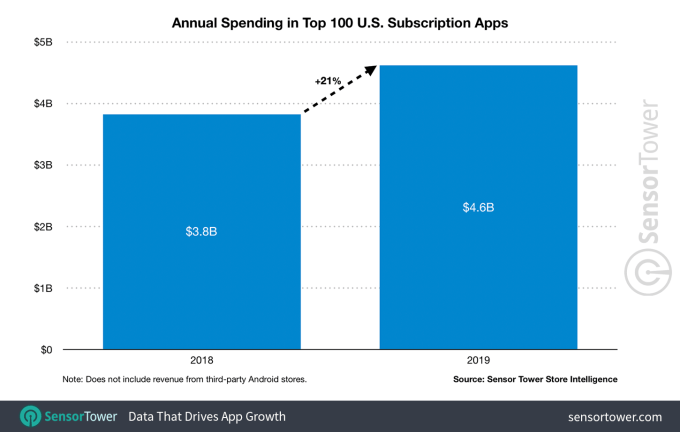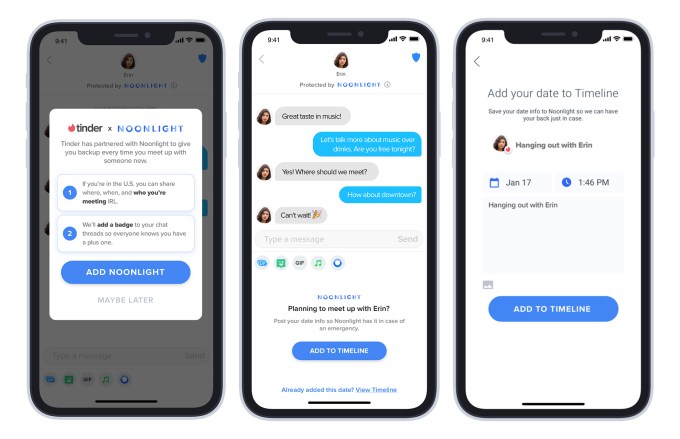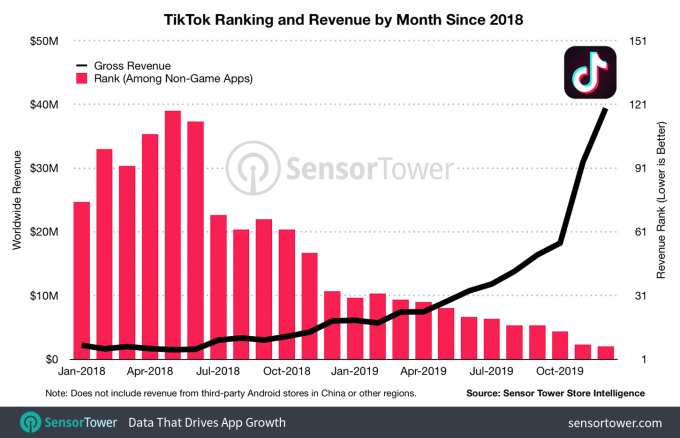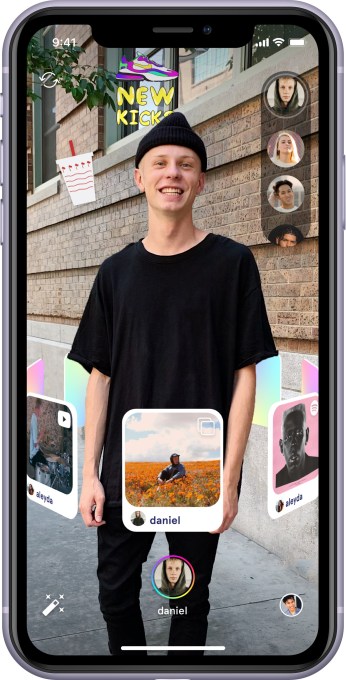Welcome back to ThisWeek in Apps, the Extra Crunch series that recaps the latest OS news, the applications they support and the money that flows through it all.
The app industry is as hot as ever with a record 204 billion downloads in 2019 and $120 billion in consumer spending in 2019, according to App Annie’s recently released “State of Mobile” annual report. People are now spending 3 hours and 40 minutes per day using apps, rivaling TV. Apps aren’t just a way to pass idle hours — they’re a big business. In 2019, mobile-first companies had a combined $544 billion valuation, 6.5x higher than those without a mobile focus.
In this Extra Crunch series, we help you keep up with the latest news from the world of apps, delivered on a weekly basis.
This week, there was a ton of app news. We’re digging into the latest with Apple’s antitrust issues, Tencent’s plan to leverage WeChat to fend off the TikTok threat, AppsFlyer’s massive new round, the booming subscription economy, Disney’s mobile game studio sale, Pokémon GO’s boost to tourism, Match Group’s latest investment and much more. And did you see the app that lets you use your phone from within a paper envelope? Or the new AR social network? It’s Weird App Week, apparently.
Headlines
Rivals call on Congress to regulate Apple
Apple — along with other major tech companies like Amazon, Facebook and Google — was called out by smaller rivals last Friday in a congressional hearing for their anti-competitive practices. Smaller companies, including Tile, Sonos and PopSockets, spoke about how the giants wield their power and massive platforms to give themselves a competitive advantage.
Tile, in particular, spoke to a subject of great concern to app developers, explaining how it felt to have Apple co-opt ideas from third parties and turn them into core iOS features, sometimes wiping out entire businesses in the process. This behavior is now so common it even has a nickname: “Sherlocking.” The term was coined in the early 2000s, when Apple updated its Sherlock search tool on the Mac with features from a third-party application called Watson. Since then, Apple has adopted ideas from third-party apps like swipe-based typing, smart home dashboards, period tracking, reminders to “breathe,” tip calculators, screen recorders, screen time controls and using an iPad as an external display, to name just a few.
Tile is concerned about Apple’s plans to introduce a lost-item tracker that will be built into its OS.
Speaking to Congress, Kirsten Daru,Tile’s general counsel, said:
It’s like soccer. You might be the best team in the league, but you’re playing against a team that owns the field, the ball, the stadium, and the entire league, and they can change the rules of the game at any time.
At the very least, when Apple decides to copy an entire product, it should offer competitors the same access its own apps have in terms of OS integration. But Apple often just launches a new feature without providing an API to competitors, forcing them to come up with workarounds that sometimes break the rules, allowing Apple to ban their app from the App Store.
The practice is deeply unfair, stifles competition and needs to change.
Subscriptions are booming
U.S. subscription app revenue grew by 21% last year from the $3.8 billion generated by the top 100 subscription apps to reach over $4.6 billion in 2019, according to new data from Sensor Tower. The firm also found that subscription revenue by these apps accounted for 19% of the total $24 billion in U.S. consumer spend in 2019, across both the Apple App Store and Google Play.

Tinder, 2019’s top-grossing non-game app, was also responsible for 10% of the spending in the top 100 apps in 2019, thanks to recurring subscriptions like Tinder Gold ($14.99/month) and Tinder Plus ($9.99/month).
Apple and Google’s privacy controls are working
According to a new report from Fast Company that cites several data points, mobile app users are reclaiming their right to data privacy by disallowing apps and advertisers access to their location data. Since the launch of iOS 13, for example, the amount of background location data marketers collect dropped by 68%, per Location Sciences. Android 10’s option for an “only while in use” location data setting has also been useful in limiting access to this data.
AppsFlyer Raises $210 Million
AppsFlyer, a company known best for mobile ad attribution, raised a massive $210 million Series D. The company drove $28 billion in ad spend in 2019 across more than 12,000 customers, including eBay, HBO, Tencent, NBCU, Microsoft, Macy’s, Nike and US Bank. Annual recurring revenue exceeded $150 million, up 5x from its 2017 Series C.
Match group invests in Noonlight, adds in-app safety features
After bad press about sexual predators using Tinder and Facebook Dating’s big launch, Match Group made a new investment. The dating app giant and parent company to Match, Tinder, OkCupid, Plenty of Fish and several other dating apps announced this week it has invested in and partnered with connected safety platform Noonlight to roll out a series of safety features to its suite of dating apps. The tools include those for emergency assistance, location tracking, photo verification and an updated in-app Safety Center. Not included? Screening Tinder for registered sexual predators.

Tencent fights back against TikTok/Douyin with short-form video plan
Tencent is planning to update WeChat, an app with more than a billion users, with a feature that lets users publish short-form videos to their feed. The move is meant to offer a competitor to ByteDance’s Douyin in China, which now has more than 400 million daily users. In the U.S., the app is known as TikTok, and was the No. 4 most-downloaded app worldwide in 2019, and the No. 6 largest app by monthly active users.

However, TikTok has yet to figure out monetization. Forty-four percent of TikTok’s total 1.65 billion downloads to date, or 738+ million installs, took place in 2019 alone. But TikTok only grossed $176.9 million in revenue in 2019. Unlike Facebook, TikTok doesn’t collect as much personal information on its users, many of whom are younger, which limits ad targeting capabilities. The app has been experimenting with a variety of ad formats, including brand takeovers, in-feed native video, hashtag challenges (this week, it was a Fortnite dance contest) and lens filters. It even dabbled in social commerce. But it has yet to capitalize on the potential for in-app spending, as only a handful of creators are earning money from virtual tips in live streams today.
TikTok, in other words, may have the downloads and users, but doesn’t yet have a solid business. On that note, the company is also now conducting a search for a new CEO and just appointed Erich Anderson as global general counsel to help it combat its regulatory woes and deal with compliance issues.
Niantic events generated hundreds of millions in tourism revenue last year
In 2019, Niantic held 77 live events for games like Pokémon GO and Harry Potter: Wizards Unite, in 32 countries that were attended by 2.7 million people. According to Niantic’s newly launched events website, these events are also helping to boost local economies. The game maker claims it helped generate $249 million in tourism revenue across Chicago, Montréal and Dortmund, Germany.
Unfortunately for Niantic, the new Harry Potter game didn’t launch as strongly and doesn’t have the staying power of Pokémon GO. App Store reviews complain of bugs and some users believe the app is too confusing, too overloaded with game mechanics and gets too tedious, among other things. No wonder Niantic is diversifying into live events.
ByteDance deal with Merlin includes TikTok and its new Resso streaming service
TikTok is turning artists into Spotify stars and songs into chart-toppers. Now its parent company ByteDance is looking to turn its power as a hit-maker toward its own music service. ByteDance’s new music streaming app Resso, currently in testing, will also benefit from TikTok’s new deal with indie record label Merlin, announced this week. Read more about the deal’s implication here on TechCrunch.
Android app privacy policies aren’t very helpful
A study of 11,430 Play Store apps found that 14.2% used a privacy policy with contradictory statements about user data collection practices, ZDNet reported. For example, a policy may state in one part that it doesn’t collect personal information, only to say elsewhere it collects names and emails. The issue, in part, can be attributed to app developers’ use of templates. Clearly, companies are counting on the fact that few users actually read these things through. But not having an accurate and clear policy could open up the app makers to fines from the E.U. and U.S. privacy watchdogs and regulators, the report warns.
Canonical puts Android in the cloud
Canonical, the company behind the popular Ubuntu Linux distribution, this week launched Anbox Cloud, a platform that allows enterprises to run Android in the cloud, TechCrunch reported. The result is similar to what Google does with Android apps on Chrome OS, but the implementation is different. Canonical says the product will allow enterprise organizations to offload mobile workloads to the cloud, then stream those apps to employees’ mobile devices. The product is also betting on 5G to aid with low latencies. Other use cases include game streaming and app testing.
ClassPass is finally a unicorn
Missed this last week, but well worth noting: ClassPass hit unicorn status with its latest $285 million round, which brought its valuation to $1 billion. The app lets users take different classes from various fitness studios as a way to sample more types of fitness classes than they would if only paying for a single gym membership. The company has gone through several iterations of its business model, but has landed on virtual currency as a solution. The company now operates in 28 countries, and has more than 30,000 partners.
Disney sells off FoxNext Games to Scopely
Scopely, home to the top-grossing MMO/strategy game Star Trek Fleet Command and strategy MMO Kings of the Realm, just acquired a handful of games from Disney, including Marvel Strike Force. Disney acquired FoxNext Games in 2019 as a part of its $71.3 billion deal for 21st Century Fox. Marvel Strike Force is the biggest of the games FoxNet just bought, as it has been downloaded more than 26 million times to date. A new Avatar title isn’t broadly available, as it’s still in development (it only has 100,000 downloads at present).
App Store policy compliance deadlines
Apple reminded developers this week about their need to soon comply with updated policies. Guideline 4.7 sections 4, 5 and 6 were updated in June 2019 to clarify that apps containing or running code that is not embedded in the binary cannot provide access to real money gaming, lotteries or charitable donations. It also reminded developers that apps that provide their core features using HTML5 should be left to Safari, not the App Store. Kids’ apps must require a parental gate in order to link out of the app, request permissions or present purchasing opportunities. They also should not transmit personally identifiable information or device information to third parties. Plus, the ads that run in kids’ apps need to be human-reviewed for age appropriateness in order to be displayed. Apps must comply with the new deadlines by March 3, 2020.
Google I/O 2020 dates announced
Google’s I/O is coming back to Shoreline Amphitheatre in Mountain View, Calif. on May 12-14. At last year’s event, Google announced new phones (the 3a and 3a XL), the Nest Hub and Nest Hub Max, AR search, Google Lens upgrades, Duplex on the web, Assistant updates, Live caption, Live subscribe and more. What’s in store for 2020? Maybe Pixel Buds 2 and Android 11, if we had to guess!
Downloads
Octi
 This odd but interesting app offers a new social network based on AR. Friends connect by pointing their camera at one another, which allows the app to recognize them and create the friend request. After getting connected, users can look through the camera again to see the friend surrounded by floating virtual items, including favorite videos, songs and photos. The idea isn’t likely to take off as a standalone new network, but is exactly the kind of crazy AR idea that a company like Snapchat may like to try as part of its AR filters feature set, as it’s all about the in-person experience.
This odd but interesting app offers a new social network based on AR. Friends connect by pointing their camera at one another, which allows the app to recognize them and create the friend request. After getting connected, users can look through the camera again to see the friend surrounded by floating virtual items, including favorite videos, songs and photos. The idea isn’t likely to take off as a standalone new network, but is exactly the kind of crazy AR idea that a company like Snapchat may like to try as part of its AR filters feature set, as it’s all about the in-person experience.
Envelope
This crazy, Android Digital Wellbeing experimental app called Envelope is designed to combat screen addiction by helping you print out a custom envelope — basically a wrapper — for your Pixel 3a devices. The paper wrapper allows you to use your phone for calls (the app helps to light up the buttons), and leaves room for the camera. But the case also serves as a way to separate yourself from your device so you’re not distracted by notifications, nor can you get to the touch screen to play games or use time-wasting apps. This is not meant to be a daily thing, but if you’re trying a detox weekend it could be a fun way to see how long you last before ripping the dang thing open.
Butter Royale
It’s Fortnite as a food fight instead of guns and bullets, explains The Verge in their report on the new Apple Arcade title. In other words, Butter Royale a similarly styled game but one that’s more approachable for younger users and more likely to be parent-approved. And as an Arcade title, it has no in-app purchases either. The game comes from Mighty Bear, a Singapore studio founded by Candy Crush alumni.
Fortnite isn’t the only huge multiplayer game for kids to inspire newcomers. Roblox has clearly inspired Rec Room’s game platform, where users build games that can be played across mobile, console, PC and VR.
Oh, and EA’s Tetris games…before they’re gone
Last call for EA’s Tetris Blitz and Tetris 2011, which are being put out to pasture on April 21, 2020. In a message to fans, EA said:
Hello Fans, We have had an amazing journey with you so far but sadly, it is time to say goodbye. As of April 21, 2020, EA’s Tetris app will be retired, and will no longer be available to play. Kindly note that you will still be able to enjoy the game and use any existing in-game items until April 21, 2020. We hope you have gotten many hours of enjoyment out of this game and we appreciate your ongoing support. Thank you!
If you downloaded the games before the end-of-life date, you can still use them — but they’ll no longer be supported or updated. It’s not that the games aren’t well-liked — Blitz is still a top 50 puzzler on the App Store and Tetris 2011 is a top 100 title. Rather, the issue is that EA’s 15-year Tetris license has expired and it’s not renewing it, Android Community explained. But all is not lost for Tetris fans. N3TWORK Inc. has Tetris Royale now available instead.
Tweet of the Week
Anyone a sucker for a great app roundup? Good news: Federico Viticci’s annual list of his favorite apps has arrived: